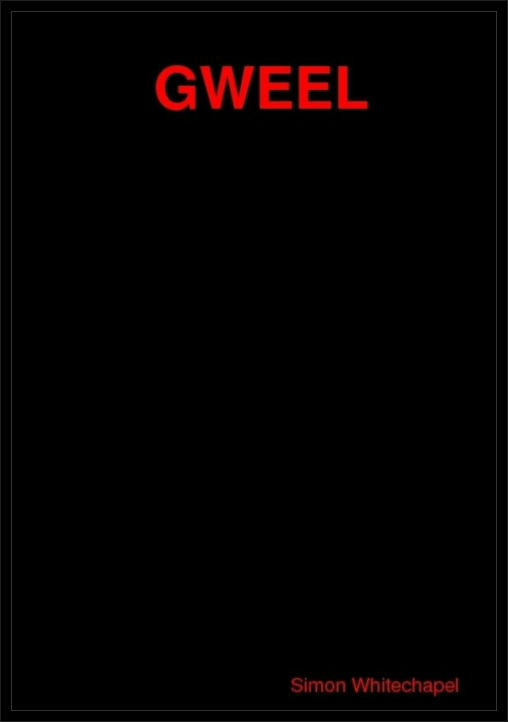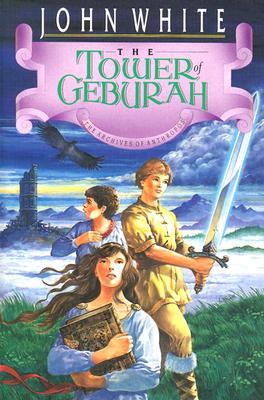 This review is a useless waste of time. I can tell you very little about Gweel. It’s a book, if that helps. It’s made of paper. It has pages. Lots of little words on the pages.
This review is a useless waste of time. I can tell you very little about Gweel. It’s a book, if that helps. It’s made of paper. It has pages. Lots of little words on the pages.
What I can’t do is classify Gweel into a genre, not because none of them fit, but because the concept of a genre doesn’t seem to apply to Gweel. It stands alone, without classification. Calling Gweel “experimental” or “avant garde” would be like stamping a barcode on a moon rock.
It may have been written for an audience of one: author Simon Whitechapel. If we make the very reasonable assumption that he owns a copy of his own book, he may have attained 100% market saturation. However, there could be a valuable peripheral market: people who want to read a book that is very different from anything they’ve read before.
It is a collection of short pieces of writing, similar in tone but not in form, exploring “dread, death, and doom.” “Kopfwurmkundalini” and “Beating the Meat” resemble horror stories, and manage to be frightening yet strangely fantastic. The first one is about a man – paralysed in a motorbike accident, able to communicate only by eye-blinks – and his induction into a strange new reality. It contains a rather thrilling story-within-a-story called “MS Found in a Steel Bottle”, about two men journeying to the bottom of the ocean in a bathysphere. “Kopfwurmkundalini”‘s final pages are written in a made-up language, but the author has encluded a glossary so that you can finish the story.
Those two/three stories make up about half of Gweel’s length. The remainder mostly consists of shorter work that seems to be more about creating an atmosphere or evoking an emotion. “Night Shift” is about a prison for planets (Venus, we learn, is serving a 103.2 year sentence for sex-trafficking), and a theme of prisons and planets runs through a fair few of the other stories here, although usually in a less surreal context. “Acariasis” is a vignette about a convict who sees a dust mite crawling on his cell wall, and imagines it’s a grain of sand from Mars. The image is vivid and the piece has a powerful effect. “Primessence” is The Shawshank Redemption on peyote (and math). A prisoner believes that because his cell is a prime number, he will soon be snatched from it by some mathematical daemon (the story ends with the prisoner’s fate unknown). “The Whisper” is a ghost story of sorts, short and achingly sad.
No doubt my impression of Gweel differs from the one the author intended. But maybe his intention was that I have that different impression than him. Maybe Gweel reveals different secrets to each reader.
I can’t analyse it much, but Gweel struck me as an experience like Fellini’s Amarcord…lots of little story-threads, none of them terribly meaningful on their own. Experienced together, however, those threads will weave themselves into a tapestry in the hall of your mind, a tapestry that’s entirely unique…and your own.
 Human cells die, and new cells regenerate in their place. After seven years, you are a completely new man. Clive Barker is Exhibit A of the hypothesis. The man who wrote great short stories like “Dread” has clearly been processed into skin flakes and loose hair and motes of dust, and in his place is…this man. Mister B Gone is rat shit. If Clive Barker can do no better than this, then I hope he never writes another book.
Human cells die, and new cells regenerate in their place. After seven years, you are a completely new man. Clive Barker is Exhibit A of the hypothesis. The man who wrote great short stories like “Dread” has clearly been processed into skin flakes and loose hair and motes of dust, and in his place is…this man. Mister B Gone is rat shit. If Clive Barker can do no better than this, then I hope he never writes another book.
It’s a written as the account of a demon who has escaped from hell via a fishing net (one of the perks of being a “fantasist” or whatever is being able to develop the plot via random spurts of Dadaist nonsense) and his adventures wandering the earth. Eventually he encounters Johannes Gutenberg, inventor of the printing press, which is the subject of a war between the forces of heaven and hell. One of Clive Barker’s recurrent ideas is that God and the Devil are not the embodiments of good and evil, but more along the lines of political rivals waging turf wars over corporeal fiefdoms.
The book doesn’t have a fourth wall. Jakobok the demon addresses the reader directly and urges him to burn the book, lest he damn his soul. The first time this happened I smiled. The second time made the corners of my mouth upturn by a zeptometer. The third time make me feel the inklings of fear. “He’s not going to do this through the whole book, is he?” By the tenth time I successfully trained my eyes to skip any paragraph containing the phrase “burn this book,” and I thereby greatly shortened my reading time.
What’s the point of such an annoying and persistent plot device? What’s the goal here, Barker? Is it to irritate the reader? I felt like I was reading a novelised version of that Paul Provenza/Penn Jillette Aristocrats movie, with a hundred comedians all telling the same joke, one after the other, and all of them acting like it’s fresh and new.
The story is worthless and uninteresting. Lots of events happen, but Clive Barker never brings any interest to any of them. It’s about demons and angels but I feel like I’m reading about sitcom characters. There are scenes in Hell that make it seem like Dogpatch with extra fire. Maybe that’s Mister B Gone’s biggest crime. It makes the supernatural seem dull and boring.
Clive Barker’s characterisation, never good, here reaches a new low. If you packed every character in Mister B Gone into an apple cart and pushed it off a cliff, I would be worried about the welfare of the apple cart.
Incredibly, this is Clive Barker’s first novel since 2001, discounting the Abarat books (which don’t sound interesting enough for me to want to read). Perhaps that’s the explanation. Maybe he’s more into screenplays and games and action figures these days. But shouldn’t a genius produce great work even when he half-asses things? They say Stephen King wrote The Running man in a single week…
In the meanwhile, someone please harvest the dust from Clive Barker’s house circa the Reagan presidency and put it to good use!
 Some say Archives of Anthropos books are clones of the Narnia books. This is completely wrong. Author John White puts his own unique touch on the Narnia franchise: he makes it gayer and more boring.
Some say Archives of Anthropos books are clones of the Narnia books. This is completely wrong. Author John White puts his own unique touch on the Narnia franchise: he makes it gayer and more boring.
To explain, CS Lewis’s landmark series led to a boom industry of Christian books that involved children being whisked away to magical worlds. A Wrinkle in Time by Madeleine L Engle is a good example. It is a good book that compares well with Lewis’s work. The Tower of Geburah is the runt of the litter. On its own, it can perhaps mount a justification for its existence. But it led to a series of six Narnia ripoffs, which is really a bit much.
The story…? Mostly Narnia. I think he changed some names around. There’s a character called Mary who is exactly like Edmund. Actually I think she was from the second book. It’s been a while. The magical realm is called Anthropos, and it’s ruled by a king called Kardia. For Greek students, this means you are going on a magical journey to the nation “Man,” ruled by the goodly king “Heart.” Every time John White needs a name he just jacks it from some foreign language.
Many adults enjoy A Wrinkle in Time, but the only people who enjoy The Tower of Geburah are people who read it as kids. I’m not one to take away from anyone’s formative memories…but damn it, you were a child. You spent your days jamming crayons and glue into your mouth. We don’t let children drive, we don’t let children drink, and we don’t let children vote. Why do you think your child opinions on literature are worth a shit?
My advice is to re-read The Tower of Geburah with the greatest of caution. You first experienced it through the warped perspective of childhood. You might think adulthood would give you a greater appreciation of this animal, but in this case you’re just more likely to notice the faux fur.
 This review is a useless waste of time. I can tell you very little about Gweel. It’s a book, if that helps. It’s made of paper. It has pages. Lots of little words on the pages.
This review is a useless waste of time. I can tell you very little about Gweel. It’s a book, if that helps. It’s made of paper. It has pages. Lots of little words on the pages. 

